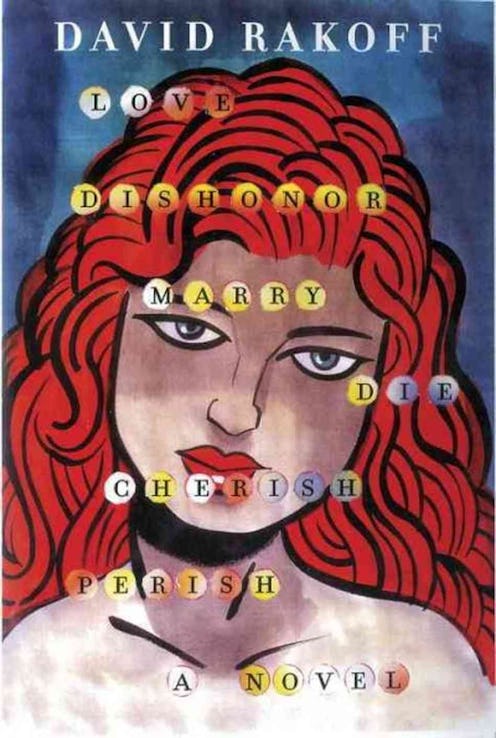Books
Late, Great David Rakoff's Rhyming Novel

David Rakoff’s posthumous novel in rhyme. For this Rakoff fan, the news of the book brought first a sad reminder of his absence, then excitement for the book, and then confusion. What is a novel in verse? I asked. A rhyming novel: I had never heard of such a thing before. I imagined a long Dr. Seussical narrative, full of silly forced rhymes and goofy proverbs.
And in Love, Dishonor, Marry, Die, Cherish, Perish (Doubleday), Rakoff’s rhymes do, at times, read sing-songily. (Sometimes I even found myself with a melody carrying myself through the verses, and imagined it all acted out on stage, with puppets.) But the melodiousness is not a bad thing: In fact, it's perfect and genius, because it balances out the surprisingly heavy subject matter of the novel. In the span of just 113 pages, Rakoff points to almost every aspect of American life in the 20th century. He packs into the lines a huge span of emotional and situational issues by singing of different characters, each with his or her own plight.
The huge scope of the themes here is even more impressive when you consider Rakoff's painstaking dedication to the rhyme. The novel is delivered in precise anapestic tetrameter. (To harken back to your sophomore year poetry class, this means each line has three feet and each feet has three syllables — not an easy thing for even full-time poets to pull off. And this is the same meter of Yertle the Turtle, so my initial Seussian expectations do ring true after all.)
And in this novel, filled with death, disease, infidelity, and love (one of these things is not like the other), the verse is sometimes funny, heavy, or both. Look here: Early in, Rakoff delivers a scene with a mother and her son:
She gave up entirely the impulse to say,
"It's lovely out, Cliffie, why don't you go play?"
And play where, exactly? The yard was an eyesore,
(They'd seen in a newsreel, a famine in Mysore,
Identical dirt turned to similar mud,
A sacred cow chewing its sad, holy cud
Flies crawling over a child's thin, dry face,
She heard Clifford whisper, "That's just like my place!").
Rhyming eyesore and Mysore: Brilliant, unexpected. A kid recognizing Mysore as his messy backyard: Hilarious, but very sad, too. There's artistry in both the structure and the language.
While both the content and the form of this novel are impressive, the most awe-inspiring and poignant aspect of the novel is the story of its creation, which the New York Times details here. Rakoff's editor says that the writer was "extremely passionate about the project. He’d been ruminating on it for a decade. This was late 2010, and of course he was quite sick at this point; he’d been battling cancer for some time." Rakoff finished the manuscript of the book while enduring treatment and surgeries, but died soon after in August of 2012.
The novel is everything that Rakoff was: impressive and poignant; also, witty, insightful, clever, tragic, joyful. And just like the title suggests, it's all these things at once.